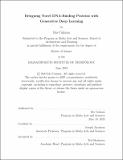Designing Novel DNA-Binding Proteins with Generative Deep Learning
Author(s)
Calman, Ido
DownloadThesis PDF (7.258Mb)
Advisor
Jacobson, Joseph
Terms of use
Metadata
Show full item recordAbstract
Protein-DNA interactions play a critical role in various biological processes, such as gene regulation and genome maintenance. Designing protein backbones specifically tailored for DNA binding remains a challenging task, requiring the exploration of novel computational approaches. This thesis presents a novel framework for gen- erating protein backbones that exhibit affinity for DNA molecules. The proposed methodology leverages Graph Neural Networks (GNNs) for encoding protein struc- tures and diffusion models for conditional sampling. The GNNs capture the intricate relationships between amino acids in the protein backbone, allowing for the effective encoding of structural information relevant to DNA binding. The diffusion models enable the conditional generation of protein backbones, given specific DNA sequences as input. The thesis proposes a Transformer architecture and provides a practical way to diffuse from its protein encoding. The findings from this research have significant implications for the design and engineering of DNA binding proteins, facilitating ad- vancements in fields such as synthetic biology, gene therapy, and drug development.
Date issued
2023-06Department
Program in Media Arts and Sciences (Massachusetts Institute of Technology)Publisher
Massachusetts Institute of Technology